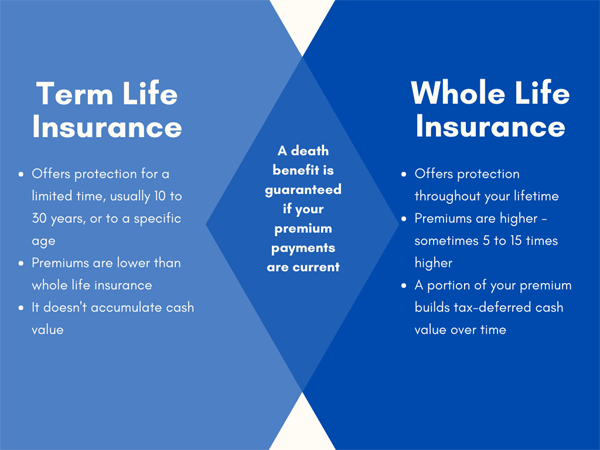When it comes to protecting your loved ones’ financial future, life insurance is an invaluable tool. However, choosing the right type of life insurance can be confusing. Let’s explore the key differences between term and whole life insurance to help you make an informed decision:
Term Life Insurance:
- Coverage Period: Term life insurance provides coverage for a specified period, typically ranging from 10 to 30 years. Once the term ends, the coverage expires, and you no longer have insurance protection.
- Affordability: Term life insurance is generally more affordable than whole life insurance, making it an attractive option for individuals looking for temporary coverage or on a tight budget.
- Flexibility: Many term life insurance policies offer the flexibility to convert to a whole life policy at a later date if your needs change or you decide you want permanent coverage.
- No Cash Value: Unlike whole life insurance, term life insurance does not accumulate cash value over time. This means you won’t receive any money back if you outlive the policy term.

Whole Life Insurance:
- Lifetime Coverage: Whole life insurance provides coverage for your entire life, as long as you continue to pay the premiums. This guarantees that your beneficiaries will receive a death benefit whenever you pass away.
- Cash Value Accumulation: One of the unique features of whole life insurance is that it accumulates cash value over time. A portion of your premium payments goes towards building cash value, which you can borrow against or withdraw from if needed.
- Level Premiums: With whole life insurance, your premiums remain level for the duration of the policy. This can provide stability and predictability in your financial planning, as you won’t have to worry about premium increases as you age.
- Estate Planning Benefits: Whole life insurance can play a crucial role in estate planning, providing liquidity to cover estate taxes or other expenses and ensuring your loved ones are financially protected.
In summary, the primary difference between term and whole life insurance lies in the coverage period and cash value accumulation. Term life insurance offers temporary coverage at an affordable price, while whole life insurance provides lifetime coverage and the added benefit of cash value accumulation. Consider your financial goals and needs carefully when choosing between the two to ensure you select the policy that best suits your circumstances.
